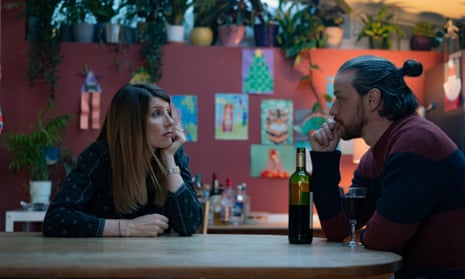The Covid documentaries have been coming thick and fast. We have had films recorded in real time from doctors. We have had thoughtful overviews that piece together our and other countries’ responses with the benefit of hindsight. Earlier this week, we had a Horizon special on the development of the vaccines that may, without hyperbole, save the world.
Art, however, takes longer. The factual programming has been, almost without exception, terrifically good: sober, meticulous, grappling with vast amounts of data and dramatic footage and wrestling it into comprehensible, valuable forms for an exhausted, bewildered and lay audience. It has informed us, brilliantly. But it is art, the stories we tell ourselves about extraordinary and frequently traumatic experiences, that helps us come to terms with them. Dennis Kelly’s Together (BBC Two) may be the first major work for a mass audience that succeeds in this task.
This claustrophobic, 90-minute two-hander was directed by Stephen Daldry and filmed in just 10 days. It is about a warring couple who are thrown together by lockdown. There will be some for whom its dark comedy does not work at all. It is not quite what we expect from television. For a start, it is all talk – monologues often, duologue the rest of the time – and very little action. There is an inescapable staginess about it, set as it is within the confines of a single house. The characters (named in the credits only has “He” – James McAvoy – and “She” – Sharon Horgan) talk only to each other or, breaking the fourth wall, to the viewer directly. They frequently overlap one another, rather than speaking in turns. You can see that it might put off some people.
But if you are not put off – if you like it, or if you lean in, or perhaps if you lean to the side and round the unexpected presentation to what is behind – Together is an absolute wonder. Of construction, as freewheeling conversations return to and re-nose old subjects, different perspectives illuminate the same facts or the past is recalled and rehashed into revelation. Of performance, with McAvoy and Horgan giving it their understated all as the divided pair who are, despite their many disparities and difficulties, clearly not done with each other yet. Of writing, with Kelly capturing not just the specific stresses of lockdown, but the particular enmity of a couple held together only by the child they should not have had. And, by the end, of the cautious rapprochement that can come if a couple make the journey – as bizarre circumstances can sometimes force them – to whatever “rarefied” land, as He puts it, waits for them on the other side of hate.
It is also a miracle of compression. It captures perfectly the emotional dilapidations of a dying relationship. If there is anyone who recognises nothing of themselves, a partner or a partnership in their bitter exchanges, especially during the final row (cathartic though it proves), I wish to live inside your head and life for ever.
Together took in the effects of lockdown from the petty (supermarkets running low on stock) to the tragic. She’s aged mother is persuaded to go into a care home at the start of lockdown, when her daughters think it will be safer than her living alone or being visited by multiple carers and possible disease vectors. The chronicling of her hospitalisation, with Horgan balanced on the cusp of disbelief and utter collapse, was a tour de force of writing and acting. It managed to embed the personal in its wider political context, too – not least with She’s apparently simple, emotionally devastating account of what the phrase “exponential growth” really means when applied to an infection rate. “So, I can’t escape the feeling that Mum didn’t die – she was killed … by stupidity, by dumb fuckery,” says She. It was a time to cry for all we have lost.
He has a counterpart monologue, book-ending a first-act anecdote about an encounter with a supermarket shop assistant. It encapsulated the inertia of society, even in the wake of cataclysm and many individuals’ desire for change, and stripped whatever tears and optimism had been left to you by then.
Yet Together still ends on what counts, in Kelly’s world, as a hopeful note (he is the creator of Utopia and The Third Day, Horgan’s collaborator on Pulling and a master of brutally realistic options). The pair decide that the crumbling ruin of their relationship – “weird, infuriating, irritating, depressing” – is worth shoring up. At least for long enough to go outside and look together at the dead parakeet their son has found in the garden, on the other side of hate.

Comments (…)
Sign in or create your Guardian account to join the discussion